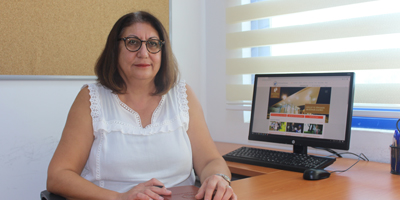There is no Ideal Nutrient to Replace Breast Milk

Chairperson of the European University of Lefke (EUL) Faculty of Health Sciences Department of Nutrition and Dietetics Prof. Dr. Cahide Yağmur made some statements on the occasion of 1-7 October World Breastfeeding Week.
Pointing out that in order to spread the breastfeeding of the baby, various health practices are carried out all over the world and legal programs and civil society campaigns are implemented for the promotion of breast milk, Yağmur said that “Breastfeeding has a biological and emotional impact on the mother and the baby, and has many immunological, psychological, social and economic benefits for both mother and baby”. Underling that there is no ideal nutrient to replace breast milk, Yağmur said that mother and families should be warned and breastfeeding training should be given to every mother in order to prevent breastfeeding problems that might occur after birth. She further said that “Mothers need to be informed about breast feeding, maintaining breastfeeding and switching to additional food” and emphasized the necessity of explaining the importance of breast milk, which is a miraculous nutrient each time during pregnancy follow-up, starting breastfeeding within the first hour after birth, and convincing the mother that colostrum must be given to the baby and the baby does not need any additional nutrients, including water for the first 6 months, only the breast milk is enough.
Staying in the same room supports frequent breastfeeding
Underlining that the babies must be fed every time they cry, Yağmur said that there is no need for waiting for a length of time and added that the baby’s stomach emptying time varies between 2-4 hours and that the baby will cry during these periods. She also said that “It should be remembered that the baby may cry due to some discomfort other than the need for feeding” and stated that staying in the same room supports frequent breastfeeding and that the smell, sound and crying of the baby also stimulated the lactation.
Ideal mixture that would replace the breast milk couldn’t be found
Yağmur said that “Breastfeeding ensures the communication between the mother and the baby” and added that in order to create the psychological bond between the mother and the baby, baby should be breast fed within the first 30 minutes, mother and the baby should share the same room and the baby should be breast fed each time s/he cries. Yağmur also said that “The milk of each living creature is the most suitable food for its offspring. Because it was made in accordance with the growth rate and digestive system characteristics of the baby in terms of milk composition” and added that ideal mixture (Mama- Formula) that will replace the breast milk couldn’t be found. She also continued that The World Health Organization (WHO) and the United Nations Children’s Fund (UNICEF) recommend that all babies should be exclusively breastfed for the first 6 months after the birth, supplementary foods should be initiated at the 7th month and breastfeeding should continue until the age of 2 and underlined that breast milk is the most appropriate and most natural nutrient that meets all of the nutritional elements that are sufficient for the normal growth and development of every newborn baby born on time, receiving adequate requirements from the mother with full repositories in the womb.
Yağmur also listed the benefits of breast milk as follows; Breast milk is clean and germ-free, economical, disease-protective, the best-most natural-freshest milk. It is always clean, the temperature is ideal, the content is suitable for the needs of the baby, and contains special substances that protect against diseases. It is protective against allergies and protects the baby from rash. It helps the baby’s spiritual, physical and intelligence development. It facilitates a loving relationship by strengthening the emotional bond between mother and baby. It reduces the risk of developing some chronic diseases such as type I diabetes, obesity and cardiovascular diseases. Diarrhea, abdominal pain and constipation are less common. Provides jaw and tooth development.
